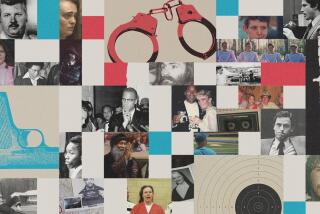William Zantzinger, convicted of killing Hattie Carroll and denounced in Bob Dylan song, dies at 69
- Share via
On Feb. 8, 1963, a young, socially prominent tobacco farmer from southern Maryland named William Devereux Zantzinger was drunk at a charity ball at Baltimore’s old Emerson Hotel. Carrying a cheap toy cane and dressed in a top hat at the Spinsters Ball, he began the evening in a spirit of jest by imitating Fred Astaire.
As he continued to drink throughout the night, Zantzinger, who was a husky 6 feet 1, became more threatening in his demeanor. He assaulted a bellhop with his cane and, according to news accounts at the time, shouted at a waitress, “Hey, black girl, bring me a drink.” He fell down on his wife while dancing with her. Then he went back to the bar and demanded a drink from Hattie Carroll, a 51-year-old black barmaid with 11 children and a history of heart problems. “Just a minute, sir,” she said, which angered Zantzinger. It was not how the white man was used to being treated on his 630-acre farm.
He thrust a racial profanity at Carroll and struck her with his cane. She served him his bourbon and then stepped away. Hours later, she collapsed and died of a stroke, and William Devereux Zantzinger, at 24, was charged with homicide. Because of several inconclusive factors, including Carroll’s already poor health, the charge was reduced to manslaughter.
The court case of Zantzinger, who died Jan. 3 at 69, received national attention at a volatile moment in the civil rights movement. Bob Dylan immortalized Zantzinger and Carroll in a protest song about race and class, “The Lonesome Death of Hattie Carroll,” which appeared on the folk singer’s 1964 album “The Times They Are A-Changin’.” “The Lonesome Death of Hattie Carroll,”
Time magazine called Zantzinger a “rural aristocrat,” because he was the son of a politically connected real estate developer in Washington, D.C. Following graduation from the Sidwell Friends School in 1957, Zantzinger married and settled into the family’s colonnaded mansion while overseeing its tobacco operation on a farm called West Hatton.
Zantzinger was freed during sentencing for the manslaughter conviction to finish harvesting of his tobacco crop. He served six months in jail and was fined $625.
After his imprisonment, Zantzinger returned to Charles County, Md., and lived quietly. He and his first wife, Jane, had three children before divorcing. He married again, to a woman named Suzanne.
He operated a nightclub for a while in La Plata, Md., dabbled in antiques and went into real estate. He was known as a charitable giver to his church and held annual pig-and-oyster roasts. He belonged to a country club and the local chamber of commerce and was seen by many of his friends as a local character.
Outside his circle of friends, Zantzinger did not like to draw attention. But he did in 1991 when he was indicted for collecting more than $64,000 in rent on properties he had not owned for more than five years. He lost the homes, described as rural shacks in the county’s Patuxent Woods subdivision, because of failure to pay taxes.
Nevertheless, Zantzinger continued to collect rent -- suing some when they did not pay and evicting others. He also raised the rent on the properties. The homes were located off a dirt road and lacked indoor plumbing.
In November 1991, Zantzinger pleaded guilty to 50 misdemeanor counts of unfair and deceptive trade practices.
He was sentenced to 18 months in the county jail and fined $50,000. The judge also sentenced Zantzinger to 2,400 hours of community service and directed him to help groups that advocate low-cost housing.
“I never intended to hurt anyone, ever, ever. It’s not my nature,” Zantzinger said at his sentencing. “I got into this hole, dug it. It was my mistake. It got deeper and deeper. I’ve learned my lesson, believe me.”
Zantzinger stayed away from the media after being stung during the 1963 trial for his remarks about segregation. “Hell, you wouldn’t want to go to school with Negroes any more than you would with French people,” he had said.
He spent his later years working in relative quiet as a foreclosure auctioneer. A spokeswoman for the Brinsfield-Echols Funeral Home in Charlotte Hall, Md., confirmed Zantzinger’s death but provided no further details, at the family’s request. A woman answering the phone at the family’s home in Chaptico, Md., declined to comment.
Perhaps predictably, Zantzinger was no fan of the Dylan song or its composer, whom he called a “no-account” who had distorted the facts of the original case. He told Dylan biographer Howard Sounes, “I should have sued him and put him in jail.”
Bernstein writes for the Washington Post.
More to Read
Start your day right
Sign up for Essential California for the L.A. Times biggest news, features and recommendations in your inbox six days a week.
You may occasionally receive promotional content from the Los Angeles Times.







